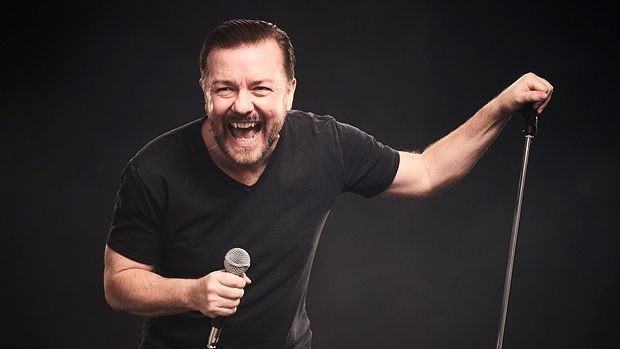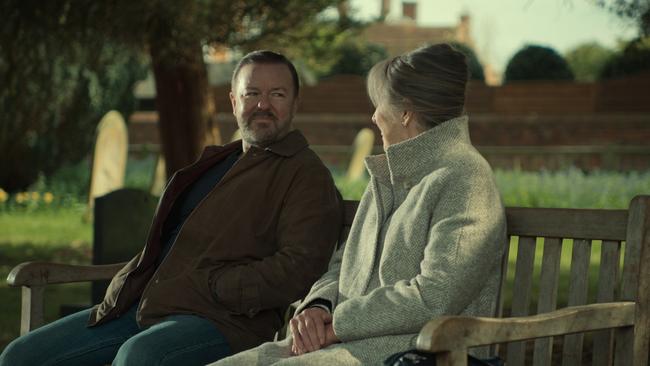‘Awkward laughs’: why Ricky Gervais keeps giving us grief in After Life
The third season of Ricky Gervais’ Netflix series, After Life, is a comedy that finds humour in grief, mortality, and even euthanasia.

The third season of Ricky Gervais’ Netflix series, After Life, is with us causing, as you might expect, some condescension, disdain and quite a bit of approbation. It is a comedy that finds humour in grief, mortality, and even euthanasia, its tagline, “Misery loathes company”.
The first season was a big success for Netflix, as was the second, the third even bigger, maybe drawing on the way most of us have experienced grief in one way or another during our lives.
Its pain is haunting and debilitating and few of us understand grieving and how to handle the ensuing emotional turmoil that accompanies the heartache. And Gervais continues to mine the intense sadness and a mixture of other unexpected emotions such as anger, nostalgia, shock and disbelief for some rather uncomfortable laughs.

Written, directed and executive produced by Gervais, he plays Tony, a reporter for the local newspaper, The Tambury Gazette, who has decided that life without his late wife, Lisa, a brilliant, effervescent Kerry Godliman, who recently died of cancer, is devoid of meaning.
Godliman is more present in this third season than before and is a delight, and it’s even more understandable when Tony says the only thing that could make him happy is Lisa being around.
The second season continued on in the same vein as the first. Tony watched clips of Lisa on his laptop, recorded it seems on her deathbed, constantly reminding him how to live, how to turn off the alarm as he leaves the house, to feed Brandy the dog and to put the rubbish cans out each Tuesday. But for the rest of the time, he behaves with slipshod indifference, happy to fade into a kind of everyday oblivion, enlivened only by his many cantankerous confrontations.
In the third and final season he seems to still be in a kind of denial, withdrawn somewhat from the world around him, nothing really bringing him happiness, constantly descending into sadness and depression. It’s a joyless state but depressiveness seems to bring some bitter enjoyment for Tony, oddly comfortable with it, the way he is with the same crumpled clothing.
It’s little wonder that his potential romance with Ashley Jensen’s Emma, the local nurse who looked after Tony’s father before his death, also meanders away to nothingness.
Some of the other Tambury regulars return in the season but not all. Happily Penelope Wilton, who plays Anne the widow, is still there sitting on the wooden bench at the cemetery where both her husband and Lisa are buried, and is still generously offering wise and considerate advice to Tony when he comes to visit his wife. (In a gorgeous gesture at the start of this season Netflix donated 25 benches to local councils around the UK as part of a mental health initiative celebrating the launch. They were commissioned with suicide prevention charity the Campaign Against Living Miserably (Calm) and feature QR codes leading to online resources and a message of support. Each bench is inscribed with a quote from the third series: “Hope is Everything”).
However Roisin Conaty and Mandeep Dhillon who play Roxy and Sandy respectively don’t return. Dhillon who played Tambury Gazette newcomer Sandy was too busy filming in the US according to Gervais. And Conaty, the adorable sex worker, Roxy, who dates lugubrious local postman Pat was written out because her creator felt she had run out of storylines. “I haven’t seen her for ages,” Tony says in the show. “She doesn’t come round anymore. I assumed she was busy.” At the start of each episode her deflated boyfriend fills us in on her latest exploits at Tony’s front door.
We miss both of them but certainly don’t regret the absence of Paul Kaye’s deranged psychiatrist who thankfully fails to make an appearance. Tony is still affectionately mocking his side-kick, the paper’s photographer Tony Way’s Lenny. And that inspired creation Ken Otley, the head of the local amateur dramatics company played with outrageous affectation by Colin Hoult, brings the house down when he bursts into a song from Taxi Driver: The Musical. “Are you talking to me?” he sings. “Cause I’m talking to you. I don’t see no one else you could be fucking talking to.”
Gervais usually possesses an acute awareness of the precise calculus of comedy and social humiliation. In interviews he reiterates the notion of cruelty that is at the centre of his comedy.
“Anthropologists like to say the first joke was about a caveman jumping up and hitting his head,” he says. “He falls over and he didn’t mean to, and that’s funny.”
But he fails himself at times in this final season, where midway through he resorts to crude scatological sequences, needless profanity and an egregious overuse of the “c” word. The tone wobbles and he trots out a series of sketches involving the other characters as if he has simply run out of his central story.
In the final episodes he regains some equilibrium and, unlike many, I enjoyed the ending and its “life just goes on and on even when you are gone” message. Gervais in a number of interviews says the conclusion is hardly ambiguous. “We all die; but not today, the ending is saying”, as if viewers are too stupid to see what is plainly obvious.
One of the pleasures of the season is the extra screen time he allows Diane Morgan’s Kath, one of life’s unfortunates. One episode involves her attempts at dating after having reviled the “c” word before being warned by Tony that she will use it before the day is out. He’s proved right in a wonderfully amusing scene.
It’s as if Tony passes through the first four stages of grief – denial, anger, bargaining and depression – to enter some kind of acceptance stage in the final season, finally comprehending that this is the new reality, and nothing can be done to change it. Finally at some kind of peace with the loss. This might account for a certain blandness in tone at times and if Tony is more open this time around with his misfit colleagues it doesn’t stop him from cursing and verbally lashing out at those who deserve it. And not just verbally either.
A favourite scene early on sees Tony almost run down by a driver hurtling through a road crossing without slowing and he lets go a small cactus plant that smashes the rear window.
He certainly never resiles from the positions he takes and the approach that half way seems just too needlessly confronting. “I think no harm can come from discussing taboo subjects and my only duty is to do it honestly,” Gervais says.
“I just think, ‘I want to keep pushing it a little bit more’, because the problem comes, when you discuss these subjects, if you water it down for people because you think they can’t take it. And that’s offensive.”
His approach as always is unrelenting. “So you do it honestly and brutally, and hopefully like never before, and people go, ‘That’s great’. It makes people think: they can be angry or they can like it a lot or whatever, but as long as it makes them think, they’ll enjoy the ride.”
He’s funniest when nothing much is happening, just doodling to relieve life’s boredom, now that meaning has vanished. He maintains a hangdog seriousness throughout, although occasionally the wicked Gervais toothy grin and slightly insane cackle break through. And at these points Tony disappears and the effervescent Gervais momentarily takes centre stage, though it’s hard not to think it’s the director on camera laughing at some inspired improvisation from his cast.
At the end of the series you can’t help but be reminded of the final routine for Tony Hancock, one of TV’s great monologues, written by his wonderful writers Galton and Simpson for the eternally brilliant series Hancock’s Half Hour.
“A waste of time you being here at all. No plaque for you in Westminster Abbey. The best you can expect is a few daffodils in a jam jar, a rough-hewn stone bearing the legend, ‘He came and he went” and in between – nothing. Nobody will ever notice you’re not here … Nothing to leave behind me. Nothing to pass on. Nobody to mourn me. That’s the bitterest blow of all.”
After Life is streaming on Netflix.




To join the conversation, please log in. Don't have an account? Register
Join the conversation, you are commenting as Logout